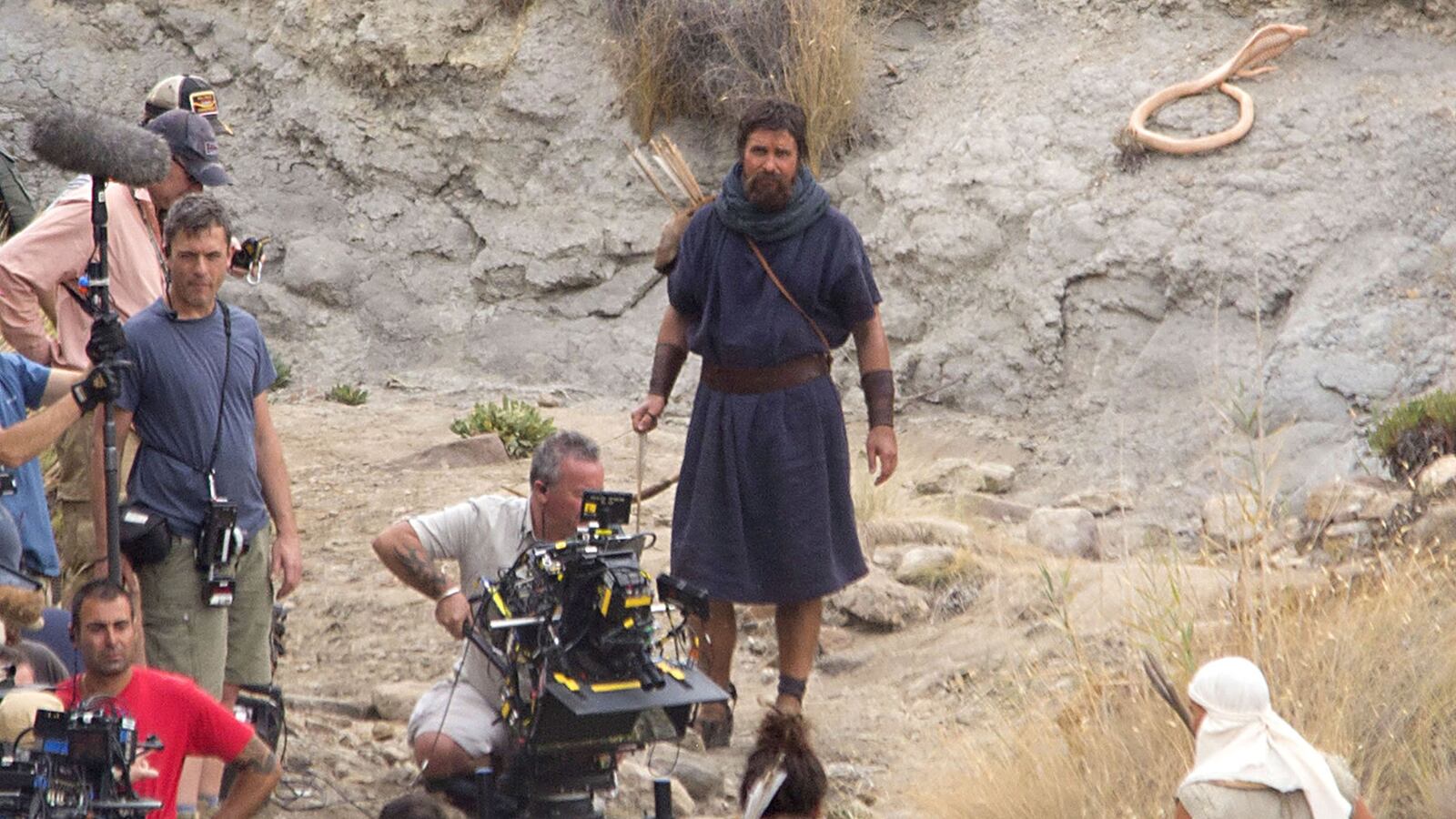Pop quiz: How many of the top 15 highest-U.S.-grossing movies of all time—adjusted for inflation—star comic-book characters?

Answer: Zero.
And how many are based on the Bible?
Answer: Two.
In the late 1950s, The Ten Commandments and Ben-Hur teamed up for $1.795 billion in adjusted domestic ticket sales. That's more than Avatar, The Dark Knight, and Transformers combined.
Which may explain, at least in part, why the movie industry seems—unofficially, of course—to have declared 2014 The Year of the Bible.
Over the next 11 months, Hollywood is planning to release more big Biblical movies than it put out during the previous 11 years combined, and the trend shows no sign of slowing down in 2015 (or beyond). For an industry that spent much of the 2000s shying away from explicitly religious fare—the controversy over the alleged anti-Semitism of Mel Gibson's The Passion of the Christ effectively wiped out the genre, despite the film's huge box office receipts—it's a remarkable about-face that's as surprising as it is sudden.
Consider the 2014 release schedule. On Feb. 28, Twentieth Century Fox is first out of the gate with Son of God, a Jesus biopic culled from the History Channel's hit 2013 miniseries The Bible. (A Bible sequel titled A.D. is set to air next year on NBC.) Paramount is up next in March with Noah, director Darren Aronofsky's epic re-imagining of the life of the Old Testament's most famous ark-builder (played by Russell Crowe). Debuting in April is Heaven is for Real, starring Greg Kinnear as the father of a boy who claims to have passed through the pearly gates during a near-death experience, and both the Mother of God drama Mary (Ben Kingsley, Julia Ormond) and Ridley Scott's Exodus (Christian Bale, Aaron Paul) follow in December, right in time for awards season.
GALLERY: Hollywood Gets Biblical in 2014: Noah, Exodus, and More (Photos)

And that's just 2014. Other faith-based projects kicking around Hollywood include a Cain and Abel movie directed by Will Smith; a Pontius Pilate picture starring Brad Pitt as the titular villain; an absurdist comedy about the Rapture (Kevin Smith's Helena Handbag); and an HBO drama about the same apocalyptic reckoning (The Leftovers).
And so, given all the Biblical hustle and bustle currently consuming Hollywood, it seems like an appropriate time to ask: What the devil is going on?
Earlier this week, I decided to put that question to the man who may have done more than anyone else in the industry to ressurect movies like The Ten Commandments and Ben-Hur for 2014: Mark Burnett. The British-born producer famous for Survivor, The Apprentice, Shark Tank, and The Voice, among other reality-series, Burnett is also a devout Christian (along with his wife, the actress Roma Downey). While watching The Ten Commandments on TV with their children for the umpteenth time, Burnett and Downey had an epiphany. "Our kids were like, 'This is not that great,'" Burnett tells me. "The special effects are quite obvious. These kids are used to Superman and Batman. People's first memories of the Bible are usually either a movie or a piece of art. So we thought an updated version could be really powerful."
The resulting 10-hour series, The Bible—Burnett's first scripted project—debuted on the History Channel on March 3, 2013. It was very popular (to put it mildly). The series premiere attracted 13.8 million viewers; the second and third installments pulled in about 11 million each; the finale beat AMC's The Walking Dead and HBO's Game of Thrones. All told, The Bible racked up about 100 million cumulative viewers over a six-week period, making it the third most-watched cable series or miniseries of 2013. Even the DVD was a hit, moving 525,000 copies in its first week to become the fastest-selling disc of the last half-decade. "A lot of people said to us, 'Nobody's going to watch The Bible in primetime TV. You guys are crazy,'" Burnett says. "But Roma and I said, 'We think you're completely underestimating this faith-based, Christian audience.' And we proved that it was enormous, and that it makes sense to create something in that world."
Now other Hollywood bigwigs seem to have taken notice (including the bigwigs at 20th Century Fox, the studio that snapped up Burnett's Son of God shortly after The Bible scored such impressive ratings.) Which brings us to the first of three reasons I think 2014 is shaping up to be the Year of the Bible: money.
It's no secret that the industry is stuck in a bit of a rut. The demand for blockbusters is bigger than ever, but there are only so many comic books to mine for characters and stories, and you can't reboot the Spider-Man franchise or churn out Iron Man sequels forever. The Bible, meanwhile, has chapter after chapter and verse after verse of (to put it crassly) action-packed material—Moses, David, Job, Jesus, Revelation, and so on—plus a "fanbase" that's even larger and more avid than Marvel Comics'. "When we looked at it we saw that around about 50 million Americans sit in a church each week," Burnett explains. "On a monthly basis that's almost 150 million, because not everybody goes every Sunday. And that community is tightly knit. The last thing Jesus said to his disciples was to go out and spread the word." No marketing budget is big enough to buy the kind of word-of-mouth that flows organically through the Christian community, and no secular endorsement has the power to influence as many viewers as, say, Rick Warren's or Joel Osteen's. The potential payoff, as studio executives now seem to be realizing, is huge.
But there may be more to 2014's Bible resurgence than cold, hard cash. Burnett, for one, believes that viewers are more open to messages of spiritual uplift in the wake of the 2008 financial crash than they may have been in an earlier, more comfortable age. "Part of it has to do with hope," he says. "I feel like a lot of people, as a result of what happened in 2008, are still hurting. And they're relying upon their faith. Joel Osteen on Sunday mornings gets more than 7 million viewers. That's more people watching than some primetime network TV shows."
My sense is that politics is playing a part as well. In the Age of George W. Bush, religion was a polarizing force in the public sphere. Evangelicals were on the march for the GOP; less devout (or vocal) Americans felt somewhat besieged. But with Obama in office, the religious right is no longer as powerful as it once was, and the old, divisive battles over "values" seem to have waned.
This may have had two effects—subtle but real—on moviegoing audiences. The first is that the sort of Evangelicals who took center stage during the Dubya years might feel a little "left out" at this point—meaning they're especially eager to participate in any mainstream cultural event that's willing to cater to them (such as The Bible). The second is that less fervent Americans no longer recoil from anything that smacks of overt religiosity because responding that way no longer feels as politically urgent as it did in, say, 2004. As a result the hard-core Christian community may be more ready than ever for a movie such as Exodus—and rest of America may be more open to it.
So by mining the good book for blockbuster stories, Hollywood may be on to something. But as rewarding as the approach may seem, it's worth remembering that it's not without risks as well. In Burnett's opinion, The Bible succeeded in large part because it was faithful to its source material. "What's critical when you're dealing with the Bible is that you're accurate," he says. "The first thing we did was to get a group of 40 church leaders and run scripts by them. There is an enormous audience, but it is very serious. This is not a subject like doing a western or sci-fi. You can't just make it and hope for the best. There's a way to get a massive audience if you're faithful, and there's also a potential backlash if you're not. And the backlash would be pretty enormous."
Seems like someone at Paramount agrees. According to the Hollywood Reporter, the studio recently demanded changes to Aronofsky's Noah after screenings for religious groups in New York and Arizona generated "troubling" responses. At the time, Aronofsky was "dismissive," according to a talent rep with ties to the project. But apparently the studio is aware of a possibility that its auteur prefers to ignore. Sure, the lucrative faith-based audience can giveth—but it can also taketh away.






